 Vampire Weekend's Surprising Jewish Stories
Vampire Weekend's Surprising Jewish Stories
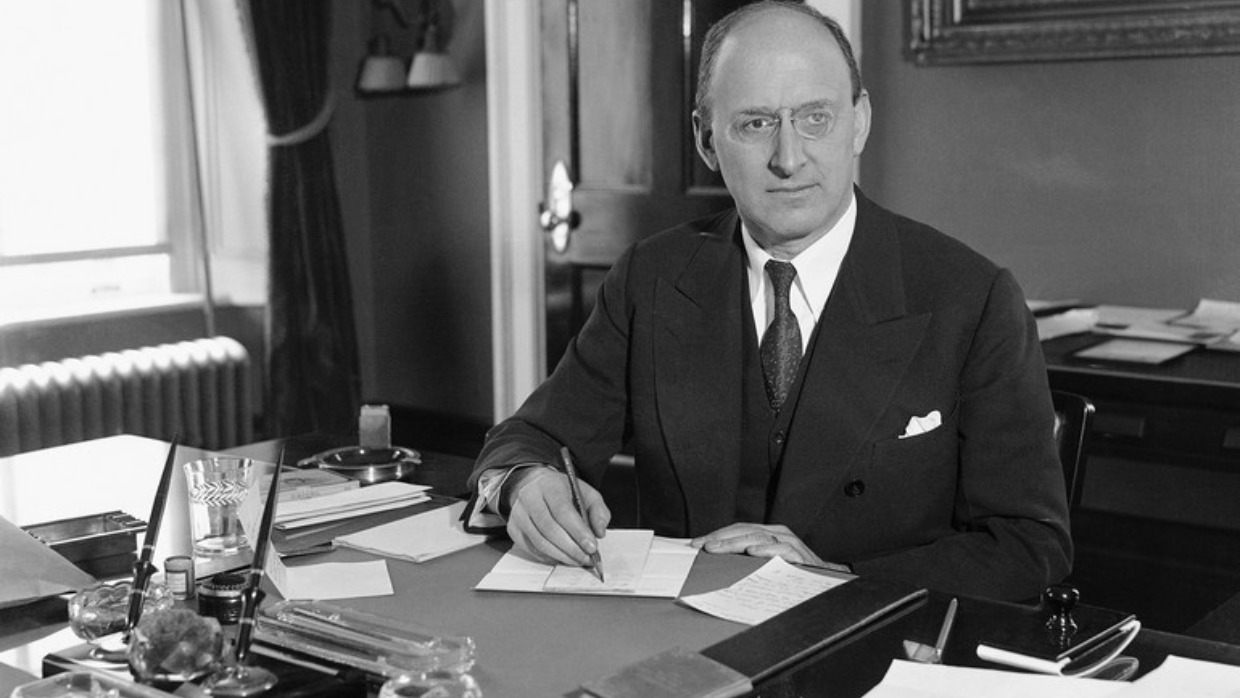

10 min read
The only Jew in FDR’s cabinet, the influential politician was in a position to stand up for being a Jew and help save Jewish lives during the Holocaust.
On the holiday of Purim, Jews worldwide celebrate the salvation of the Jewish people in the ancient Persian empire. Haman, royal vizier to the Persian King Achashverosh, plotted “to destroy, kill and annihilate all the Jewish people, young and old, men and women, in a single day” (Scroll of Esther, 3:13).
In the face of Haman’s imminent genocidal decree upon the Jewish People, Mordechai directed his niece, Queen Esther, to approach the King and beseech him to save her people. Esther was understandably reluctant because she could be killed immediately for entering the king’s chamber without being summoned. In the face of her demurral, Mordechai responded with strong words, telling her, “If you keep silent at this time, relief and deliverance will come to the Jews from another place, while you and your father's house will perish. And who knows, perhaps it is precisely for this opportunity that you became queen” (Esther 4:14).
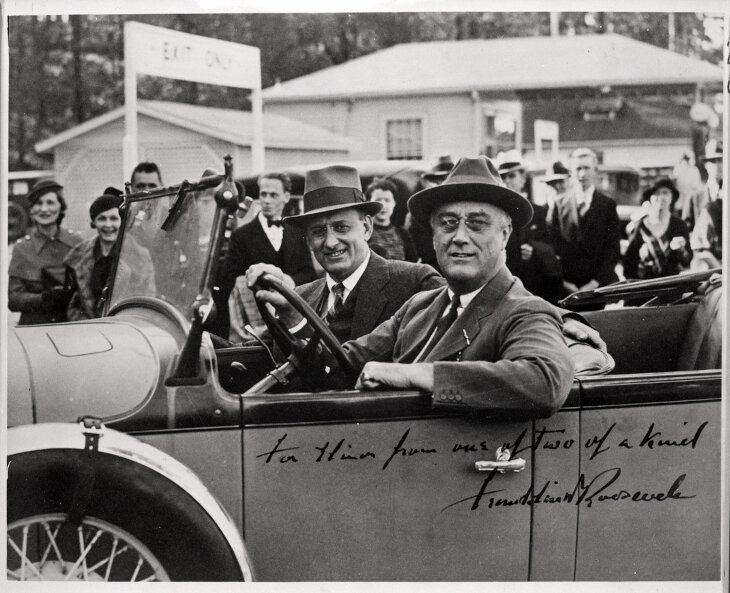 President Franklin D. Roosevelt and Henry Morgenthau Jr. in a car on Feb. 9, 1934. The inscription by FDR reads “From one of two of kind.” | Franklin D. Roosevelt Presidential Library and Museum
President Franklin D. Roosevelt and Henry Morgenthau Jr. in a car on Feb. 9, 1934. The inscription by FDR reads “From one of two of kind.” | Franklin D. Roosevelt Presidential Library and Museum
Understanding that this was the reason she had ascended to royalty and influence, Queen Esther made an immediate about-face. Rising to the occasion, she instructed Mordechai to tell all Jewish residents of Shushan to fast and pray for three days and nights and upon the conclusion of the three days, she would approach the king uninvited. “And if I am to perish, I shall perish…" (4:16)
Her strategy worked, Haman and his 10 sons were hung, and the Jewish people were saved by God.
Fast forward two millennia, another Jewish leader named Henry Morgenthau Jr. (1891–1967) would experience his Queen Esther Moment when the Jewish people were being threatened with annihilation. He was born in New York City to a prominent family of German Jewish descent. His father, Henry Morgenthau Sr., was a successful real estate investor and diplomat and had served as ambassador to the Ottoman Empire during the presidential administration of Woodrow Wilson.
Henry Morgenthau Jr. served as the United States treasury secretary in the Roosevelt and Truman administrations from January 1, 1934, until July 23, 1945. Morgenthau stabilized the US dollar during the Great Depression, helped finance the "New Deal," prepared the US economy for war, and later funded the war effort by selling war bonds.
He was the only Jewish person to serve as a cabinet member during Roosevelt's administration. He was very devoted and loyal to Roosevelt, despite the President’s failure to take concrete actions to save European Jewry from the Holocaust or allow Jews to save themselves by immigrating to the United States.
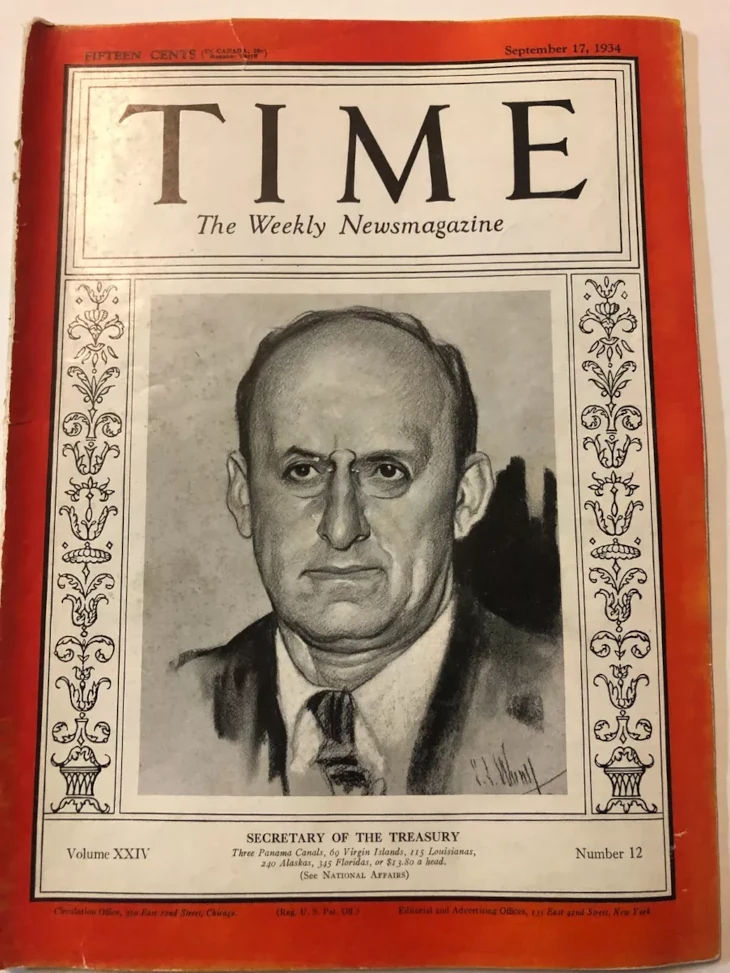
In 1943, several months after the US State Department confirmed Nazi Germany’s mission to annihilate all the Jews of Europe, Morgenthau became directly involved in the rescue of the Jews in Europe.
The catalyst for Morgenthau’s new-found involvement was the advocacy of two Jewish groups: The Vaad Hatzalah (The Rescue Committee), led by America’s leading Orthodox Rabbis, and the “Emergency Committee for the Rescue of European Jewry” led by Hillel Kook.
The Agudath HaRabbanim (Union of Orthodox Rabbis), led by Rabbi Eliezer Silver of Cincinnati, founded an organization specifically devoted to the rescue of European Jews called the Vaad Hatzalah ("Rescue Committee"). The Vaad was supported by all of Orthodox Jewry (Agudath Israel, Young Israel, Mizrachi, etc.). It was led by three of the greatest Sages of America: Rabbi Eliezer Silver, Rabbi Avraham Kalmanowitz, and Rabbi Aharon Kotler. The leaders of the Vaad were willing to do anything to save their fellow Jews, recognizing that saving lives was the priority.
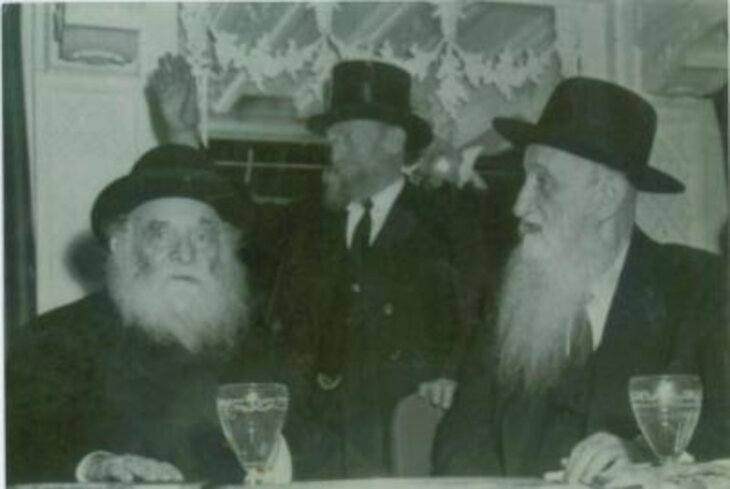 Rabbi Aharon Kotler, Rabbi Eliezer Silver, Rabbi Avraham Kalmanowitz
Rabbi Aharon Kotler, Rabbi Eliezer Silver, Rabbi Avraham Kalmanowitz
In mid-1943, the heads of Vaad Hatzlalah met with Morgenthau for the first time. Rabbi Kotler, Rabbi Kalmanowitz, and lay leader Irving Bunim pleaded with him to change American policy that had thus far done little to prevent the destruction of European Jewry. Visibly moved by the words of these great rabbis, Morgenthau called Secretary of State Cordell Hull and demanded a joint meeting with the President concerning the Nazi murder of the Jews in Europe. When Hull politely refused, Morgenthau shocked him by responding, “If I do not get the meeting, my resignation will be on Mr. Roosevelt’s desk in the morning.” Morgenthau got his meeting with Roosevelt, and although it did not create immediate changes in US policy, it paved the way for creating the War Refugee Board a few months later.
The Bergson Group was led by Hillel Kook, one of the heads of Irgun in America and nephew of the First Chief Rabbi of Mandatory Palestine, Rabbi Abraham Isaac Kook. He also called himself Peter Bergson, thus the name of the group. He established the Emergency Committee for the Rescue of European Jewry. The Committee, which included Jewish and non-Jewish American public figures, worked to publicize the facts of the Nazi’s annihilation of the Jews and lobby the President and Congress to take action to save the remnants of Europe's Jews.
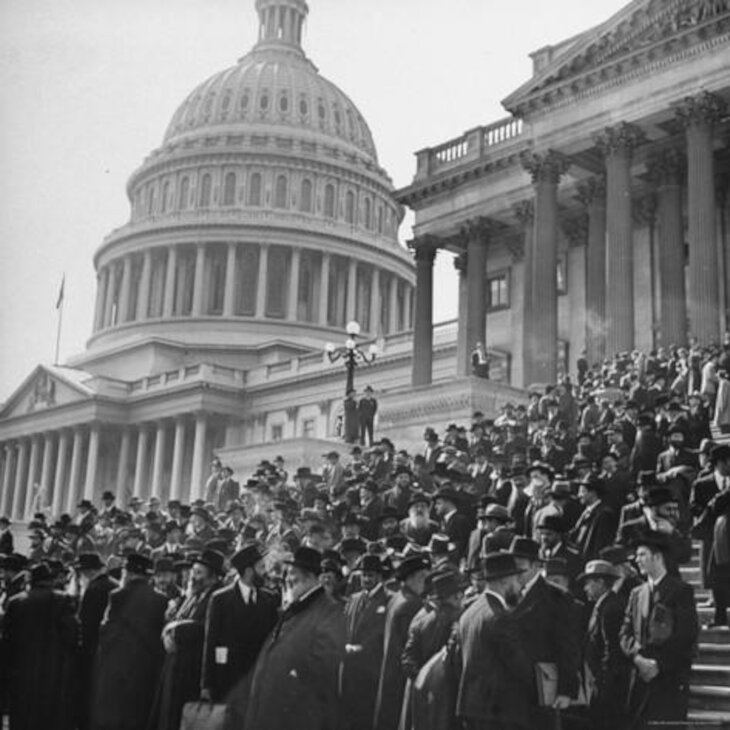 The Rabbis March in Washington
The Rabbis March in Washington
One of the Committee's more well-known actions was a protest Kook organized, known as the “Rabbis' March.” The protest took place in Washington, D.C., on October 6, 1943, three days before Yom Kippur. The group of over 400 rabbis marched to the United States Capitol, Lincoln Memorial, and White House in Washington, DC. The March’s success was limited by the actions of some of FDR’s Jewish friends (who were more concerned about FDR and less concerned for their fellow Jews in Europe), including Reform leader Stephen Wise.
A few months later, on January 13, 1944. Treasury staff members John Pehle, Randolph Paul, Ansel Luxford, and Josiah DuBois presented Morgenthau with an 18-page memorandum entitled "Report to the Secretary on the Acquiescence of This Government in the Murder of Jews.” After reading it, Morgenthau’s immediate response was, “I am physically ill.”
As a result, three days later, on January 16, 1944, Morgenthau personally visited the White House and met with President Roosevelt. The following week, the president issued an executive order establishing the War Refugee Board on January 22, 1944.
Through the efforts of the War Refugee Board, steps were finally taken to save Jews in Europe. Refugee camps were prepared in North Africa, and safe havens were arranged in Palestine, Switzerland, and Sweden. The War Refugee Board also lobbied Roosevelt to publicly condemn the mass murder of Jews by the Nazis, which he did on March 24, 1944.
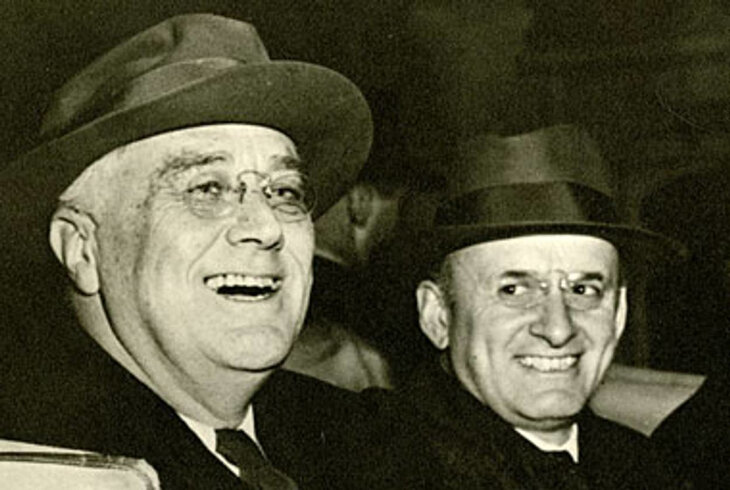
By attracting international attention to the desperate plight of Hungarian Jewry, the War Refugee Board contributed to the cessation of deportations of Hungarian Jews to Auschwitz. The Board also sent Swedish diplomat Raoul Wallenberg and others to protect the Jews of Budapest. The American Jewish Joint Distribution Committee funded Wallenberg's rescue work through the War Refugee Board. The work by Wallenberg in Hungary was one of the most successful and vital rescue efforts accomplished by the War Refugee Board.
It is difficult to determine the exact number of Jews rescued by the War Refugee Board. Professor David Wyman (1929-2018), a noted Holocaust historian, credited the War Refugee Board with playing a crucial role in saving as many as 200,000 Jews and 20,000 non-Jews. At the end of the war, considering reports of ill-treatment of the Jews in the DP camps, Morgenthau and the War Refugee Board also convinced President Truman to send an American envoy, lawyer Earl Harrison, to examine the situation personally, and following his trip, the situation in the DP camps improved.
Yet, there was a time during the war when even Morgenthau hesitated.
Shortly before Purim, in February 1945, Irving Bunim arranged for an urgent meeting with Morgenthau and was accompanied by Rabbi Aharon Kotler and Rabbi Avrohom Kalmanowitz, both of whom had escaped Europe and were using any means at their disposal to try to save the European Jews.
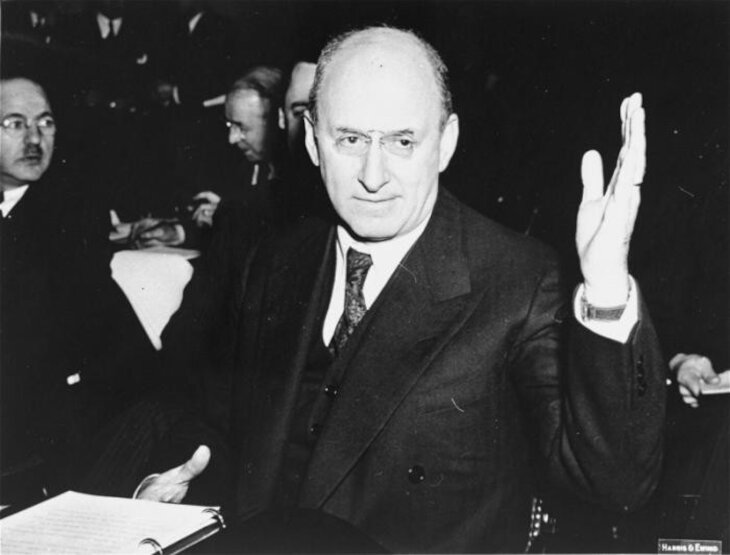
They came with a desperate request. The 'Musy Negotiations' were underway, which involved a payment of close to a million dollars to the Germans in exchange for releasing Jews from concentration camps and sending them to Switzerland.
The Vaad Hatzalah had the astronomical sum pledged to them by another Jewish organization. Yet, that organization insisted the Vaad receive official US government approval to transfer the funds through American agents in Switzerland. The Vaad Hatzalah appealed to Morgenthau to grant them official permission. Morgenthau responded that American foreign policy was not to pay ransom to the enemy: "Millions for defense but not one cent for tribute."
“One single Jewish life is worth more than all the positions in Washington!"
Rabbi Kotler did not speak English, and Secretary Morgenthau did not understand Yiddish, so Bunim had been serving as their translator. However, Morgenthau's tone was clear to Rabbi Kotler, even before Bunim said a word. The answer was NO.
Unable to hold back his emotions, Rabbi Kotler looked at Morgenthau with piercing blue eyes. With a voice shaking, he pointed at the Secretary of Treasury and said in Yiddish, "Bunim, tell him that if he cannot help rescue his fellow Jews at this time, then he is worth nothing, and his position is worth nothing! One single Jewish life is worth more than all the positions in Washington!"
After a few awkward moments, Bunim began translating, somewhat softening the Rabbi’s message as he spoke. Rabbi Kotler realized his words were not being conveyed accurately and cried in Yiddish, "Nein, nein Bunim, zugt em vus ich hub gizugt! No! Tell him exactly what I said!" Bunim realized that this was not a time for social niceties. He cleared his throat and silently prayed, knowing that countless Jewish lives hinged on his success.
"Sir… Rabbi Kotler feels that because you are afraid of losing your prominent position in the government, you may be unwilling to help us and your fellow Jewish brothers and sisters. He wants you to know that one Jewish life is worth more than any office."
Hearing this, Morgenthau turned white and placed his head on his desk, covering his face in his hands.
"Tell the Rabbi that I am a Jew. Tell him I'm willing to give up my life — not just my position — for my people.”
Finally, Morgenthau raised his head and cried, trembling with emotion, "Tell the Rabbi that I am a Jew. Tell him I'm willing to give up my life — not just my position — for my people.”
In the face of Rabbi Kotler’s challenge and words of truth, Morgenthau recognized his Queen Esther Moment. He rose to the occasion and enabled the Vaad Hatzalah to continue the negotiations, directly bringing about the release of 2,000 Jewish women from Ravensbruck. His actions live on eternally, in the lives he saved and the example he set.
We each have our own Queen Esther Moments. A time when we face a choice as to whether we will stand up for the Jewish people and Jewish values. It might be at work, on a college campus, or social media, on onstage at the Oscars. If you are able to stand up and do something, will you? Will you educate yourself and others on Jewish values and Israel’s right to defend itself? Will you proudly wear a Jewish symbol or kippah? Will you write to encourage elected officials and community leaders to support Israel and the Jewish people?
And, if you are like Morgenthau, someone in a position with real influence, will you act as he did, knowing there are values more important than your job or ephemeral popularity?
When your Queen Esther moment comes, what will you choose?

Please correct- Esther was not Mordechai's niece, she was his cousin. As clearly mentioned in the megillah and explained by meforshim. Your depiction of him as her uncle is an erroneous belief, possibly stemming from Josephus which is hardly a Torah source. Please fix this.
Opinions which hold that Mordechai and Esther were uncle and niece: Targum 7:6; Targum Sheini 2:7; Even Ezra 8:1; Pirush Harambam on Megillas Esther 8:1 “Mordechai is my uncle, my father’s brother”; Pirush Rebbe Shmuel Di Uzida 8:1; Menos HaLevi 8:1 “He is my father’s brother”; Mam Loez 8:1 “He is my uncle, my father’s brother”; Krovetz of Purim in the end “Takfah Im David” and the Siddur Yaavetz comments that this refers to Mordechai, her uncle.
The pesukim say that Mordechai and Esther were cousins, and multiple sources say that, but to claim there are no sources that they were uncle and niece, is "an erroneous belief" is flat out wrong. Please do research before commenting next time.
Unfortunately, we are in Exactly this situation today. Sen. Schumer absolutely failed his "Morderchai" moment. There are still too many Jews who either want to hide their religion/ethnicity or use the perverted excuse of "tikun olam" to further the cause of any minority except their own. We also have a President who declares his support for Israel and the Jewish People then stabs us in the back. We desperately need a person with the power and influence of Morgenthau, but so far, one hasn't been found.
Sen. Schumer is absolutely the worst senator, American, or Jew. You can pick your choice. He has no understanding of anything except his own ambitions, etc. He is power hungry and cannot be worthy of the title of senator which he has held for far too long. The only choice the public has is to VOTE him and others just like him out of office. He is a disgrace to the title of human being or the Jewish ideal of mensch.
Sorry, he is not a hero. Acted way too late. He and Roosevelt complicit in the destruction of European Jewery. Saved maybe 200,000? Well, 6 million were murdered and how many lives destroyed.
Complicit is the correct term . We as one of The Nations chose to this path . Anyone notice the % of divorces of that generation, how generations of work and money would be gone from the proper inheritance into the hands of girlfriends or boyfriends. We lost our Esther opportunity , let’s see if we can get it right this time .
US policy has always been to demand the release of the wrongfully imprisoned, not to pay for their release (at least not publicly.) My father served in WWII and from the President on down, job one was defeat of Japan and the Axis powers. It was far worse that before the war began, democracies including the US admitted so few refugees. They could have gotten out, but there was no where they could go in.
Likewise Israel’s job right now is the defeat of Hamas. Unfortunately the Arab countries are imitating the US etc. by not admitting the civilian Gazans into their countries.
I appreciated the article very much. It touched my heart
Thank you, Rabbi Levine!
This article needs to be sent to Chuck Schumer who failed his Queen Esther Moment.
So true! Amazing, amazing article!! Send it to Schumer, Jonathan Glazer, and one of the biggest Jewish failures, George Soros.
Thank your, Rabbi Menachem Levine, for an amazing, germane, and timely piece!!
GREAT piece!
Unfortunately there was no shortage of "Jew haters" in the US at that time. The Allies had to be careful making deals with the Nazis that could make Stalin suspicious of the Allied goals. So Roosevelt had to trend carefully in "making any deals" with the hated Nazis. Geopolitics is so complex it can be scary and overwhelming. Mr. M did his best within his power. At the end of the war he wanted to convert the Germans to a total agricultural country so they could never again conduct war. Of course,that did not happen. In reality the US needed the German scientists and the Germans as a bulwark against the aggressive evil Soviets. In geopolitics "sides" are continually changing based on who is powerful at that time.Life is not "storybook" good and evil. Lots of "gray" area to work in.
Sounds like you're trying to color FDR's antisemitism a light gray!
Geopolitics may be complex, but turning his back on the Rabbi's peaceful protest march to DC in an attempt to appeal to his humanity and allow entry to European Jews seeking refuge from the jaws of a horrific death is nothing less than very black, unconscionable behavior.
“The Allies had to be careful making deals with the Nazis that could make Stalin suspicious of the Allied goals. So Roosevelt had to trend carefully in "making any deals" with the hated Nazis.”
You mean the same Stalin who made a treaty with the Nazis at the beginning of the war to divide up Poland. The Allies had to worry about making Stalin suspicious ? Nonsense! You need to rethink your excuses for Roosevelt and the Allies. They just didn’t care about Jews.
There is a Kabalistic teaching that at the essential core of the soul of every Jewish person is a spark of willingness to give up one's life, if necessary, for the sake of God, the Torah and the Jewish People. This spark is buried deep in the subconscious and most of us never access it. It would appear that Morgenthau, in his epiphany "...I am a Jew...I'm willing to give up my life — not just my position — for my people,” had connected to the very core of his soul.
Well said. However FDR Zon the end had the power to disrupt the Holocaust by bombing it's veins and arteries---thevrail lines the largest killing camps needed. The camps also had sectors for slave labor. There was material was made. All targets. Many Russians and Poles also were in these camps, thus making argument via Le that destruction of camps was not special favor to Jews. FDR was a flawed man
As heroes often are.
Defeating the Nazis was the highest priority. It outweighed stopping transports to the camps.
Who said they were mutually exclusive? For instance, it's well know that the US diverted its resources from 'defeating the Nazis' to save over 200 Viennese show horses (see Operation Cowboy). Horses, yes, Jews...
Bombing the railways might have done both - it would also have disrupted supplies to the army.
Nope , the priority was to ensure that Southeast Asia would remain in the hands of the European conquerors, defeating Japan . Thus we protected MaoTse Tung in his crusade , unknowingly.The results of squandering our Esther responsibilities are still with us here in USA.Home of the Nations , United against Israel .